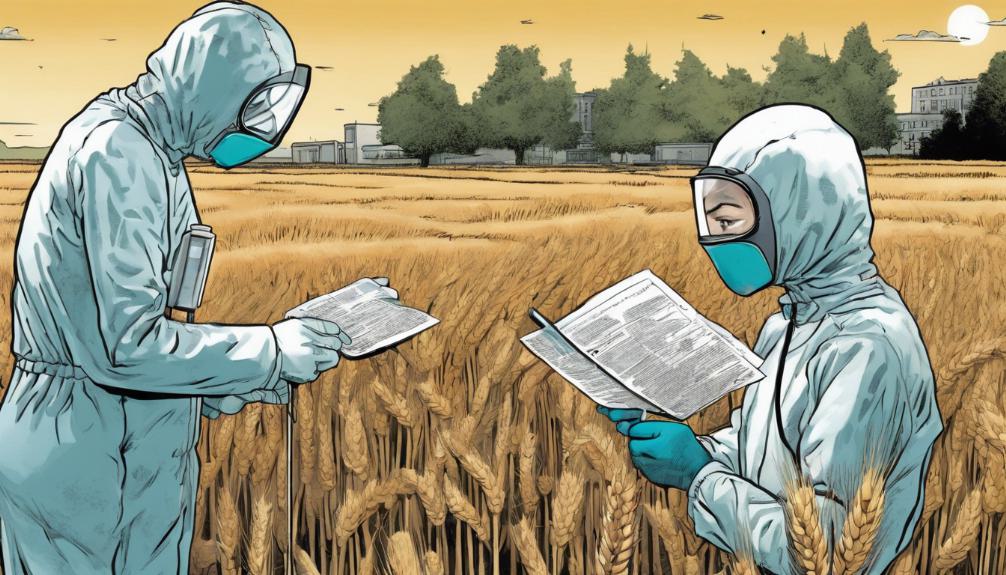Expedite Herbicide Lawsuit: Were You or A Loved One Diagnosed With Non-Hodgkins Lymphoma
The escalating legal challenges against the manufacturers of Expedite Herbicide, due to its potential link to Non-Hodgkin's Lymphoma, represent a critical juncture for both the agricultural industry and public health. As affected individuals come forward with their claims, the question of safety standards and regulatory oversight looms large. This discussion aims to explore the intricate details of these lawsuits, the scientific basis of the health risks associated with herbicide exposure, and the legal recourse available. With implications that stretch far beyond the courtroom, understanding the breadth of these cases could be crucial for anyone potentially impacted.

Lawsuit Overview
The Expedite Herbicide lawsuit centers on allegations that exposure to various Expedite-branded herbicides has led to Non-Hodgkin's Lymphoma diagnoses in individuals who mixed or applied these products. The legal actions aim to hold the manufacturers accountable for failing to adequately warn users about the potential health risks associated with their products. A range of Expedite-branded herbicides, including Expedite Grass & Weed Herbicide and Expedite Onestep Grass and Weed Herbicide, are under scrutiny. These products, widely used in non-residential settings such as airports, golf courses, and industrial sites, are designed to target actively growing weeds. The lawsuit seeks compensation for individuals diagnosed with Non-Hodgkin's Lymphoma following exposure to these herbicides, emphasizing the importance of safety and transparency in product labeling and usage instructions.
Herbicide Exposure

Understanding the risks associated with herbicide exposure is crucial for individuals who frequently handle or apply products like Expedite Herbicide and its variants. These herbicides, designed for non-residential use in diverse environments such as airports, golf courses, highways, and industrial sites, are nonselective weed killers targeting actively growing weeds. The application process involves specific equipment, including Expedite and Nomix systems, tailored to enhance the effectiveness of these products. Additionally, some variants offer a combination of postemergence and preemergence weed control, providing residual effectiveness for extended periods. This wide range of applications underscores the importance of proper handling and safety precautions to mitigate exposure risks, especially in settings that require regular use of such herbicides.
Health Risks

Given the widespread use of Expedite Herbicide and its variants in various non-residential settings, it is essential to explore the potential health risks, particularly the link to Non-Hodgkin Lymphoma following exposure. Non-Hodgkin Lymphoma, a type of cancer that affects the lymphatic system, has been increasingly reported in individuals with prolonged exposure to certain herbicides, including those under the Expedite brand. The concerns are primarily centered around those who mix or apply these chemicals, as they may be at heightened risk due to direct contact. Studies and investigations into the components of Expedite Herbicide and its related products are crucial to understanding the extent of these health risks. Acknowledging and addressing these potential hazards is imperative for the safety and well-being of individuals exposed to these substances in their professional environments.
Legal Eligibility

Individuals diagnosed with Non-Hodgkin Lymphoma following exposure to Expedite Herbicide or its variants may be eligible for legal compensation. Legal eligibility hinges on several factors, including the nature and duration of exposure, the specific product used, and the timeline of diagnosis post-exposure. Persons who mixed, applied, or were otherwise in close contact with these herbicides at non-residential sites like airports, golf courses, and industrial areas, and subsequently developed Non-Hodgkin Lymphoma, fall within the ambit of potential claimants. The intricate legal landscape surrounding these cases necessitates a thorough evaluation by specialized legal professionals to determine the strength of the claim based on individual circumstances. Given the complexity, legal consultation is crucial for individuals seeking to understand their rights and potential for compensation.
Seeking Compensation

Navigating the pathway to securing compensation for those diagnosed with Non-Hodgkin Lymphoma after exposure to Expedite Herbicide involves a comprehensive understanding of legal rights and procedures. Individuals and their families must be aware that compensation claims are subject to specific statutes of limitations, which vary by jurisdiction. These claims often require detailed documentation of exposure, medical diagnoses, and treatment histories. Understanding the nuances of tort law, particularly as it pertains to product liability and negligence, is crucial. Engaging with experienced legal professionals who specialize in toxic exposure cases can significantly enhance the prospects of a successful claim. Such legal experts can navigate the complex litigation process, negotiate settlements, and if necessary, represent the affected parties in court, ensuring that their rights are fully protected and advocated for.
Case Evaluation

Evaluating a case for potential compensation due to Non-Hodgkin Lymphoma following exposure to Expedite Herbicide requires a thorough analysis of medical records, exposure history, and legal precedents. Attorneys specializing in toxic exposure cases consider the duration and frequency of herbicide handling, correlating these factors with the onset of health issues. Documentation proving use or presence in areas treated with Expedite Herbicide products, including Expedite Grass & Weed Herbicide and its variants, plays a crucial role. Experts may review scientific studies linking the active ingredients in these herbicides to lymphoma to establish a causation argument. The legal team assesses the strength of the evidence against product manufacturers, considering past settlements and court decisions involving similar cases to gauge the potential outcome of a lawsuit.
Next Steps

For those diagnosed with Non-Hodgkin Lymphoma following exposure to Expedite Herbicide, initiating the legal process is a critical next step. Securing legal representation can significantly impact the outcome of your case. Experienced attorneys in this field can provide a comprehensive evaluation of your situation, guiding you through the complexities of litigation. They will gather necessary evidence, including medical records and exposure history, to build a compelling case on your behalf. It is also crucial to act swiftly due to statutes of limitations, which can vary by jurisdiction. Contacting a lawyer as soon as possible ensures that your rights are protected and maximizes your chances of receiving compensation for medical expenses, lost wages, and suffering.
Frequently Asked Questions
How Does the Diagnosis of Non-Hodgkin Lymphoma Specifically Relate to the Use of Expedite Herbicide, Given the Wide Range of Factors That Can Cause the Disease?**
The link between Non-Hodgkin Lymphoma (NHL) and the use of Expedite Herbicide centers on the exposure to the chemicals present in the herbicide during its application or mixing. Despite the multifactorial etiology of NHL, which includes genetic, environmental, and lifestyle factors, specific cases have raised concerns about the potential carcinogenic effects of chemicals in herbicides like Expedite. Ongoing legal investigations aim to ascertain the direct association and potential grounds for compensation.
What Are the Potential Environmental Impacts of Using Expedite Herbicides, Especially in Sensitive Areas Like Watersheds or Near Agricultural Land?**
The potential environmental impacts of using Expedite herbicides, particularly in sensitive areas like watersheds or near agricultural land, include the risk of contamination to water sources, harm to non-target plant species, and potential disruption to ecosystems. These herbicides, designed for non-selective weed control, could adversely affect biodiversity and water quality, prompting a need for careful application and adherence to environmental protection guidelines to mitigate such risks.
Are There Any Known Risks or Side Effects for Individuals Who Live Near Treated Areas but Are Not Directly Involved in the Application of Expedite Herbicides?**
The inquiry into potential risks or side effects for individuals residing near areas treated with Expedite Herbicides, but not directly involved in their application, remains pertinent. While specific studies directly correlating exposure to bystanders with adverse health outcomes are limited, concerns about environmental and indirect human exposure to herbicides warrant careful consideration. It is advisable for residents near treated areas to stay informed about product use and adhere to recommended safety precautions.
What Steps Can Workers or Residents Take to Minimize Their Exposure to Herbicides if They Are in or Near Areas Where Expedite Products Are Frequently Used?**
To minimize exposure to herbicides in areas where Expedite products are frequently used, workers and residents should adhere to safety protocols. These include wearing protective clothing, using appropriate respiratory protection, and avoiding areas during and shortly after application. It's also advisable to stay informed about the spraying schedule and ensure proper ventilation in nearby indoor environments. Seeking advice from health professionals regarding potential risks and precautions is recommended for comprehensive safety measures.
Has There Been Any Research or Findings on the Long-Term Ecosystem Effects, Such as Soil Health or Non-Target Plant Species, From the Use of Expedite Herbicides?**
Research on the long-term ecosystem effects of Expedite herbicides, including impacts on soil health and non-target plant species, is crucial for understanding environmental implications. While specific studies on Expedite products may vary, general research indicates that herbicides can affect soil composition, microbial communities, and biodiversity. It is essential for ongoing investigations to address these potential consequences to ensure environmental safety and sustainability. Further empirical studies are needed to comprehensively evaluate these effects.

This post has been generated by AI and was not reviewed by editors. This is Not legal advice. Please consult with an attorney.




